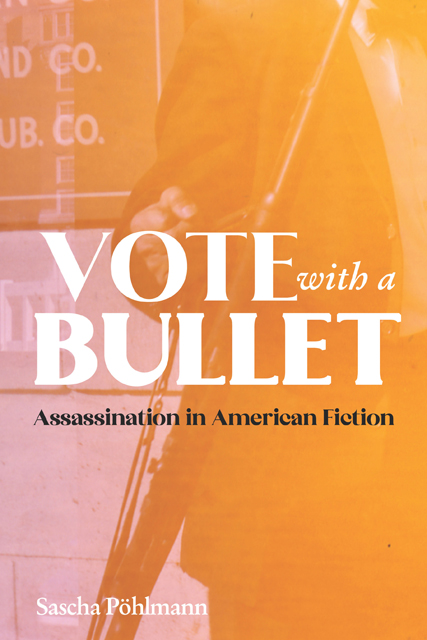Book contents
- Frontmatter
- Dedication
- Contents
- Introduction: The Individual and Society
- 1 The Princess Casamassima (1886)
- 2 The Assassination Bureau, Ltd. (1910/63)
- 3 All the King’s Men (1946)
- 4 Solar Lottery (1955)
- 5 The Manchurian Candidate (1959)
- 6 The Parallax View (1970)
- 7 Libra (1988)
- 8 The Dead Zone (1979)
- 9 11/22/63 (2011)
- 10 Big If (2002)
- 11 Checkpoint (2004)
- 12 The Good Father (2012)
- Conclusion
- Works Cited
- Index
10 - Big If (2002)
Published online by Cambridge University Press: 14 January 2023
- Frontmatter
- Dedication
- Contents
- Introduction: The Individual and Society
- 1 The Princess Casamassima (1886)
- 2 The Assassination Bureau, Ltd. (1910/63)
- 3 All the King’s Men (1946)
- 4 Solar Lottery (1955)
- 5 The Manchurian Candidate (1959)
- 6 The Parallax View (1970)
- 7 Libra (1988)
- 8 The Dead Zone (1979)
- 9 11/22/63 (2011)
- 10 Big If (2002)
- 11 Checkpoint (2004)
- 12 The Good Father (2012)
- Conclusion
- Works Cited
- Index
Summary
The previous two chapters’ comparative readings of the two King novels took us well into the twenty-first century, but it is worth taking a bit of a step back again, not to consider the numerous twentieth-century assassination novels that made their home in the popular thriller/crime genre I already discussed above, but to consider the first novel of the new millennium that offers a somewhat different take on the subject after this generic fare. It is also a novel that exemplifies how assassination fiction moved on from the Cold War context in which it thrived most prominently, and how the genre still persists in very different cultural and political climates. Mark Costello’s Big If, published in 2002, deviates from the patterns that mark the texts discussed so far in that it is more concerned with the people preventing assassinations than with their perpetrators or victims.
Big If is a segmented narrative that concentrates on several characters instead of the individuals we usually see at the center of the power struggle of political violence. Vi Asplund is the connection between the two groups the novel is concerned with. On the hand, there is her family: her father Walter, her brother Jens, the programmer, his wife Peta, a real-estate agent, and their son Kai. On the other hand, there are her colleagues: Gretchen, Felker, Tashmo, and others who are working for the Secret Service (or “the Dome”) to protect high-ranking politicians and their families. With this set of characters whose backgrounds and current issues are explored in different chapters, the novel develops a networked narrative that does not coalesce into the more or less linear plot that is usually implied by the trope of assassination. Instead, the novel deals with assassination as a possibility rather than an actuality, and as such remains fuzzier and more uncertain, offering not a story of one assassin or assassination but rather the story of a set of people whose private lives are to differing degrees haunted by the background noise of the public threat of political violence. As such, despite its different narrative focus, the novel still operates within the larger framework of the tension between individual and society that finds its concentration in the motif of assassination. At the same time, however, it can build on the earlier generic tradition in order to deviate from it and break with our expectations.
- Type
- Chapter
- Information
- Vote with a BulletAssassination in American Fiction, pp. 137 - 154Publisher: Boydell & BrewerPrint publication year: 2021



